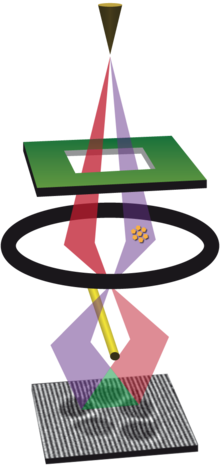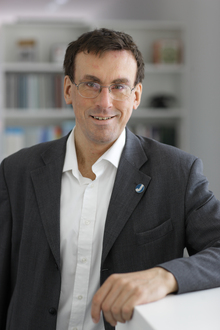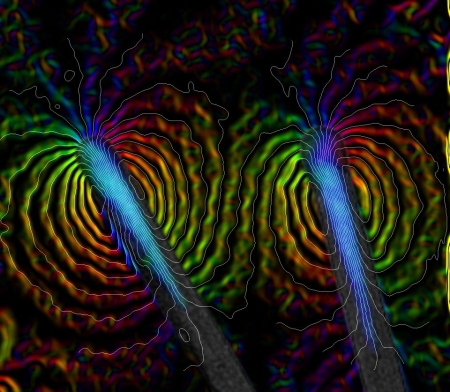Prestigious Award for Jülich-Aachen Professor Rafal Dunin-Borkowski
Jülich, December 14th 2012 – Physicist Rafal Dunin-Borkowski, Professor at Forschungszentrum Jülich and RWTH Aachen University has been awarded a prestigious Advanced Grant from the European Research Council (ERC). The Director at the Ernst Ruska-Centre for Microscopy and Spectroscopy with Electrons will use the funding, worth € 2.5 million over a period of five years, for the development of electron microscopy methods which allow the mapping of magnetic fields in the interior of materials at almost atomic resolution. Fundamental research in the field of nanomagnetism stands to benefit from the success of this project as well as application-oriented research.
Circuits and assembly units used in information technology are decreasing in size from year to year. However, it is still not clear where the physical boundaries lie. Questions such as whether, for example, data can be stored reliably in magnetisable nanocrystallites, in other words, in areas the size of just a few dozen atoms, will be addressed in future with the help of the microscopes at the Ernst Ruska-Centre. A particular challenge lies in the fact that the magnetic fields within the nanocrystallites are very weak. In order to make these visible, the magnetic signal must be clearly separated from the conventional image signal of the crystalline structure. The smaller the crystallites, the higher the technical quality of the magnetic data signal has to be, and thus the resolution of the electron microscope.
 In the process of electron holography, the electron beam in the microscope is split in two. One part serves as a reference; the second is directed through the sample and collects information about its magnetic structure. Both electron beams together create an interference pattern containing the information in an encrypted form. Analysis of the recorded hologram is necessary to allow conclusions to be drawn about the magnetic fields in the specimen.
In the process of electron holography, the electron beam in the microscope is split in two. One part serves as a reference; the second is directed through the sample and collects information about its magnetic structure. Both electron beams together create an interference pattern containing the information in an encrypted form. Analysis of the recorded hologram is necessary to allow conclusions to be drawn about the magnetic fields in the specimen.
Copyright: Forschungszentrum Jülich
Therefore, the objective of the project is to increase the spatial resolution of a special form of electron microscopy, known as "electron holography", for imaging magnetic fields in crystalline materials, to better than half a nanometre – which is approximately a factor of ten compared to current capabilities. "Only then will it be possible to visualise magnetic fields at almost atomic resolution. As a result, we can then understand directly for the first time the influence material defects, surfaces, interfaces and the local chemical composition have on magnetic characteristics of materials", explains Dunin-Borkowski.
The requirements for the success of this ambitious project, involving not only other scientists from Jülich and Aachen but also collaboration partners from the universities of Duisburg-Essen, Germany, and Edinburgh, Great Britain, are already in place in Jülich, the physicist is pleased to report: "Firstly, we have electron microscopes at the Ernst Ruska-Centre that are technically capable of achieving the necessary spatial resolution, and secondly, we have experts who know how to get the maximum performance out of the microscopes and who can quantitatively interpret the generated data."
Since February 2012, the Ernst Ruska-Centre has been home to the PICO, one of only two microscopes of its kind worldwide fitted with special correctors, which are able to correct lens defects known as chromatic aberration. This has up to now limited the resolution of conventional electron microscopes. The PICO is already able to record images of the structures and chemical compositions of the interiors of crystals with unprecedented resolution. The project partners now want to understand, how the corrective lenses can be best used in order to measure even the weak magnetic fields in nanocrystallites with the highest resolution possible.
 Professor Rafal Dunin-Borkowski, Director at the Peter Grünberg Institute and at the Ernst Ruska-Centre for Microscopy and Spectroscopy with Electrons in Jülich and Professor at the RWTH Aachen University, has been awarded a grant of € 2.5 million by the European Research Council.
Professor Rafal Dunin-Borkowski, Director at the Peter Grünberg Institute and at the Ernst Ruska-Centre for Microscopy and Spectroscopy with Electrons in Jülich and Professor at the RWTH Aachen University, has been awarded a grant of € 2.5 million by the European Research Council.
Copyright: Forschungszentrum Jülich
Rafal Dunin-Borkowski has spent more than 20 years working on advanced electron microscopy techniques, including electron holography. In 2009, he was jointly awarded the Ernst Ruska Prize by the German Society for Electron Microscopy for the use of electron holography to characterise magnetic fields in materials and devices measuring less than 100 nanometres in size.
Since April 2011, he has been Director at the Peter Grünberg Institute and Professor of Experimental Physics at RWTH Aachen University as well as Director at the Ernst Ruska-Centre for Microscopy and Spectroscopy with Electrons, run by Forschungszentrum Jülich and RWTH Aachen University under the umbrella of the Jülich Aachen Research Alliance (JARA). A British experimental scientist, he was previously the Founding Director of the Center for Electron Nanoscopy in the Technical University of Denmark in Lyngby, near Copenhagen. Other stages of his scientific career have included positions in Cambridge, Oxford and Arizona.
Quotes:
"The award recognizes the high quality of research and method development at the Ernst Ruska-Centre. Congratulations to Rafal Dunin-Borkowski to this success, "said Prof. Achim Bachem, Chairman of the Board of Directors of Forschungszentrum Jülich.
"We are very pleased that Rafal Dunin-Borkowski is the first internationally acclaimed research scientist at the Jülich Aachen Research Alliance to be awarded this Advanced Grant; we view this accolade as an incentive to further promote and press ahead with the cooperation between Jülich and Aachen", emphasized the Rector of RWTH Aachen University, Prof. Ernst Schmachtenberg.
 Electron holography makes it possible for magnetic fields in materials to be rendered visible. The colours in the figure indicate the orientation of the projected magnetic flux density.
Electron holography makes it possible for magnetic fields in materials to be rendered visible. The colours in the figure indicate the orientation of the projected magnetic flux density.
Copyright: Forschungszentrum Jülich
Further information:
Ernst Ruska-Centrum (ER-C)
Jülich Aachen Research Alliance JARA
Forschungszentrum Jülich
Peter Grünberg Institut – Mikrostrukturforschung (PGI-5)
RWTH Aachen
Contact:
Prof. Dr. Rafal Dunin-Borkowski, Forschungszentrum Jülich, Tel. +49 2461 61-9297, E-Mail: r.dunin-borkowski@fz-juelich.de
Press contact:
Angela Wenzik, Wissenschaftsjournalistin, Forschungszentrum Jülich,
Tel. +49 2461 61-6048, E-Mail: a.wenzik@fz-juelich.de
Christian Schipke, Pressesprecher, Jülich Aachen Research Alliance (JARA),
Tel. +49 2461 61-3835, E-Mail: c.schipke@fz-juelich.de
to the top




